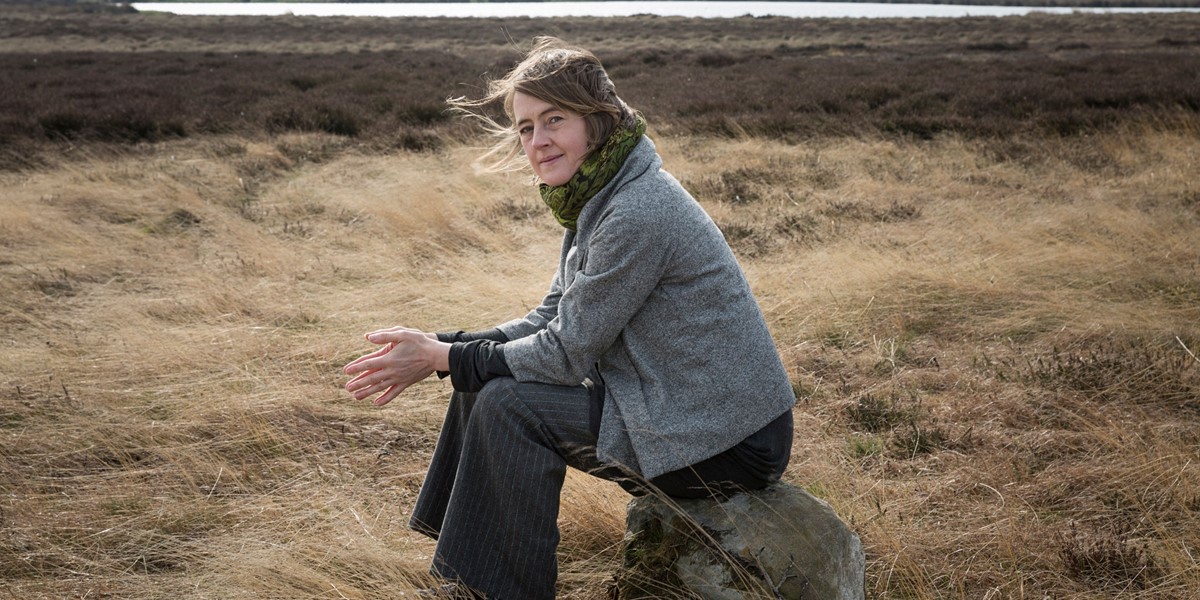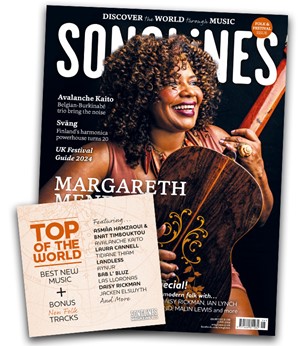Friday, February 11, 2022
Karine Polwart: A Beginner's Guide
By Tim Cumming
The Scottish musician has become one of the most lauded names on the European folk scene. Tim Cumming follows Polwart’s career from her trad band origins to the award-winning singer-songwriter we know today

While her roots are embedded in the vibrant folk scene of 1990s Edinburgh, her exquisite voice and songwriting craft have marked Karine Polwart out as an artist with few peers. Her music ranges from the epic to the intimate; the personal and the political are entwined, and tradition sits beside contemporary songcraft. Her latest album, Still as Your Sleeping, is an intimate, stripped-down delight. It was recorded in a studio near her home with pianist Dave Milligan, a friend of 20 years and close neighbour. “I can rehearse with him five minutes from my house,” she says. Their studio is a ten-minute walk away.
Like many projects this year, Still as Your Sleeping is a result of the pandemic. “It might never have happened without lockdown,” she says. The genesis was a community project focused on dementia, for which she wrote ‘Travel These Ways’, arranged by Milligan. Then they recorded ‘The Parting Glass’ for the Today programme. “And we both said, why don’t we do more of this?” Still as Your Sleeping is the result, featuring just voice and piano.
Polwart’s voice has been the vessel carrying her through two decades of contemporary Scottish and British folk releases, tours and projects. In the folk clubs of Edinburgh in the 90s, where her first band Malinky came together, singers were thin on the ground. “There was a gap in the market,” she says. “I landed when there weren’t many, and if they sang, it was in Gaelic. If I’d played the fiddle, it would have been a much harder sell.” She started writing her own songs, drawing on folk idioms, when Malinky’s 2000 debut Last Leaves appeared. “We won the Danny Kyle Open Stage award, the first year of that award, at Celtic Connections,” she says. “That was pivotal.”
It was a period where a lot of things seemed to be happening at once. After 18 months of playing big stages with The Battlefield Band in the early 2000s, she gave notice to Malinky, and put out her solo debut, Faultlines, in 2004. “It came out to no fanfare, nobody bought it. It sold 1,000 copies in a year. Then, out of nowhere, it was nominated for a whole bunch of folk awards.” She won three, including Best Original Song for ‘The Sun’s Comin’ Over the Hill’, and like the Danny Kyle award, it proved pivotal. Not that she plays from it much these days. “For a lot of people, it’s the gateway album to my stuff, but I think I’ve made better.”
While its follow-up albums, Scribbled in Chalk and the all-trad Fairest Floo’er, contain songs she still plays – from the former the BBC Radio 2 Folk Award-winning ‘Daisy’ and ‘Follow the Heron’, and ‘Dowie Dens of Yarrow’ and ‘The Learig’ from the latter – she feels she came of age as an artist with 2012’s Traces. Traces came out of a four-year break from her solo work; she’d become a mother, recorded the Side Show album as part of a residency with Scots-Canadian folk supergroup The Burns Unit, appeared on Lau’s Arc Light and joined up with the likes of Chris Wood and Jez Lowe for the Darwin Song Project. “If you normally write on your own, and you’re chucked into a room of other people to write with, it takes a while to find your feet,” she says. But after these collaborations and a residency in Cape Breton, she felt she had earned her spurs. “By the end of it I had a much clearer idea of what I was good at and what I wasn’t, what space I wanted to occupy, and what space I would happily let someone else take over.”
It’s held her in good stead in the more recent collectives Songs of Separation and Spell Songs. “By then I was really clear about what I could bring to the table,” she says. “And Spell Songs feels to me like a really mature iteration of combining different voices.”
Traces was produced by Ian Cook, of electro trio Chvrches. “It’s the first time I felt genuinely involved in the arranging and production process,” says Polwart. “There’s a confidence about Traces that is definitely a gear shift.” And a widening of perspectives from which to write. “The albums since then, they may not be obviously politicised, but they do come from a thoughtful political, philosophical perspective.”

Karine Polwart in A Pocket of Wind Resistance (photo: Aly Wight)
Those albums, including the groundbreaking, multidisciplinary A Pocket of Wind Resistance (2017) and its follow-up Laws of Motion (2018), are essential listens. Wind Resistance began as a theatre piece for a festival in Stoke Newington, London. “I told them I’d got this project about goose flight, which I’d just made up,” she remembers. “I had three months to make it, and I spent two months putting together a show, part spoken, part song.” Then she took it to the Traverse Bar in Edinburgh. Next thing she knew, it had been picked up by the Edinburgh International Festival. Working with sound designer and composer Pippa Murphy the album was released on the back of that acclaimed production. Exploring midwifery, ecology, sanctuary and solidarity, and encompassing songs both traditional and original, there is spoken word, field recordings, electronic drones, marimbas and thumb piano folded into its 57 minutes. It was shortlisted for Scottish Album of the Year.
The following Laws of Motion addresses stories and issues on the topic of migration, recorded with her stage trio comprising of Inge Thomson and brother Steven Polwart, while as a writer working with Lau’s Martin Green on outstanding tracks such as ‘Ophelia’ and ‘Suitcase’, about the Kindertransport network. “The trio with Inge and Steven,” she says, “that’s my anchor, it’s the touring trio, we know each other so well, we fit in one van...”
Just before the pandemic, her Scottish Songbook album included covers of The Waterboys, Blue Nile and John Martyn, a vein explored further on the new album, with its takes on Dick Gaughan, Alasdair Roberts, Kate McGarrigle, and a beautiful, affecting co-write she calls “a semi-composed, semi-improvised piece” between Polwart and Milligan on ‘Siccar Point’. They will be taking Still as Your Sleeping to Celtic Connections in the new year – the festival that arguably launched her trajectory with that inaugural Danny Kyle Open Stage award. It’s been a singular journey.
Karine Polwart – BEST ALBUMS

Faultlines
(Neon Records, 2004)
Her award-winning solo debut. It’s a mix of folk and Americana, with ballads like ‘The Sun’s Comin’ Over the Hill’ and ‘Faultlines’ being standout tracks, focusing on that remarkable voice.

Fairest Floo’er
(Hegri Music, 2007)
Intimate, empathic, epic, and featuring Burns alongside Border ballads such as ‘Dowie Dens of Yarrow’ or Child Ballads ‘The Death of Queen Jane’ and ‘The Wife of Usher’s Well’. A shruti box adds an otherwordly moan to ‘The Death of Queen Jane’.

Traces
(Hegri Music, 2012)
Polwart had woven politics into her songs before, but Traces pulls the focus more sharply, with songs about the Occupy movement, Trump’s Scottish golf course and a strong sense of history and how it sweeps through the ways we live now.

Karine Polwart with Pippa Murphy
A Pocket of Wind Resistance
(Hudson Records, 2017)
A groundbreaking collaboration with Pippa Murphy that crosses the borders of music and theatre, of song and spoken word, of soundscapes and balladry from Burns and the tradition. The epic and intimate work side by side to remarkable effect.

Karine Polwart with Steven Polwart & Inge Thomson
Laws of Motion
(Hudson Records, 2018)
Its songs about migration are strong, empathic works as full and rounded as the globe itself, while two spoken word pieces address nuclear war and Trump, this time giving voice to the earth itself in revulsion at the Orange One’s antics.
This article originally appeared in the January/February 2022 issue of Songlines magazine. Never miss an issue – subscribe today


